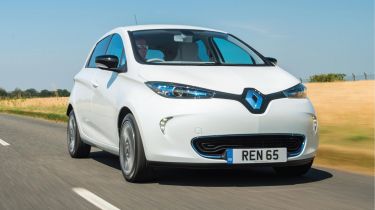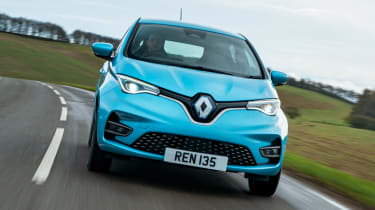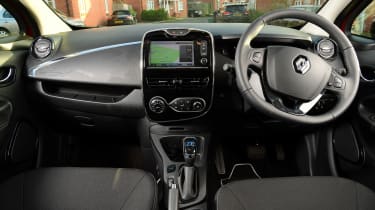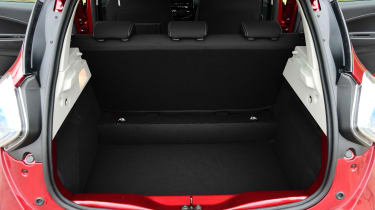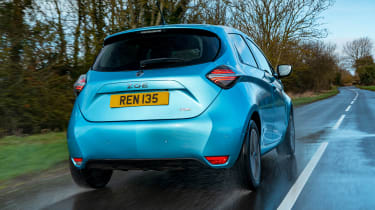Renault ZOE: old vs new
The Renault ZOE is one of Britain's most popular EVs; how has it changed?
Stylish looks, affordability and ease-of-use have made the Renault ZOE one of the best-selling EVs in Britain. In time it will undoubtedly be remembered as a key model in kick-starting the electric revolution, alongside cars like the bigger Nissan Leaf.
The ZOE first arrived in 2012 and, despite looking rather similar today, the car has changed significantly since then. Advances in EV tech have doubled its range, and it can now be charged more quickly. It's faster, safer and more luxurious inside. If you’re a forward-thinking business owner, it’s now even available as a ZOE Van.
Best electric small cars on sale now
Performance and range
The most important changes have been made to the ZOE’s powertrain and demonstrate how much progress Renault has made with battery technology. When the ZOE first launched in 2012 it had a 22kWh battery that provided up to 93 miles of real-world range in good weather conditions. This increased to 41kWh in the Z.E. 40 model which launched in 2016 and has now shot up again to 52kWh in the latest model. The latest ZOE offers a range of up to 245 miles, far exceeding the daily needs of most drivers. What's doubly impressive is that improvements in battery chemistry and design mean the 52kWh battery fits into the same space as the 22kWh one.
Not only does it offer more range but the battery can also be charged more quickly, taking DC current of up to 50kW using a type-2 plug. This can take the battery from zero to 80% in just over an hour, and plugging into a 50kW rapid-charger at a motorway services for 30 minutes adds 90 miles of range.
Performance also took a jump for the latest model, with the R135 motor boasting 28bhp more than the old R110 and an even more again over the ZOE Q90. Its extra punch and lack of gears make the ZOE feel genuinely nippy around town, and it's now more adept at overtaking.
The other big change is a 'B' regenerative braking mode, which effectively gives the ZOE 'single pedal driving'. This is where you barely need to touch the brake pedal because the deceleration effect of the motor putting energy back into the battery is so strong.
Styling
While the 2019 ZOE was virtually a new model, enough was kept the same underneath that it's effectively a very thorough update of the old car. That's most evident from outside, where most of the ZOE's attractive design has been carried over wholesale. There are quite a few upgrades though, including a new, more heavily sculpted bonnet and an even bigger Renault diamond badge with a 'holographic' 3D design, which flips open to reveal the charging port. New LED headlights are 75% brighter than the old halogen units, and the rear lights get a distinctive new look.
Elsewhere, the new front bumper not only looks different, but it helps smooth airflow around the front wheels for a few miles of extra range. Its looks are capped off with new designs for its 15-, 16- or 17-inch wheels and three new metallic paint colours called Celadon Blue, Flame Red and Quartz White.
Interior
Step inside the latest ZOE and the changes are more noticeable. There's still a large vertical panel that appears glued to the dashboard, but instead of housing a small screen, air vents and even the heater controls, this is now just the touchscreen display. It's a striking effect, particularly with the crisp 9.3-inch screen in higher trims. Attractive and easy to use rotary controls for the climate control sit beneath this, giving the dashboard a more cohesive look.
Materials have taken a noticeable jump in quality too. Where the old car had a fairly cheap-looking plastic fascia, the new one has more soft-touch materials with a horizontal band of metallic trim. A 10-inch digital instrument panel is standard to display more information to the driver, and the seat upholstery is made from recycled plastics.
Practicality
One thing that hasn't really changed between the original ZOE and latest version is practicality. This is largely because of where the battery is positioned, beneath the middle of the car and rear seats, but boot size isn't as bad as you might think. Measuring 338 litres, the ZOE actually offers more space than the 311 litres in the Ford Fiesta. You sit slightly higher in the ZOE (because of the battery), but head and legroom are still pretty decent.
If you want more space, the latest version is now available as a van too. This is almost identical to the normal ZOE but the rear windows are opaque, there are no seats or electric windows in the back, and a flat floor and mesh bulkhead have been added to safely take cargo. Its volume is one cubic metre, or up to 387kg, and it has the R110 motor.
Safety
When the ZOE was upgraded for 2019, it gained new electronics that made it possible for Renault to fit the latest safety kit. This includes features like Lane Departure Warning, Lane Keep Assist and Traffic Sign Recognition. The ZOE can also switch its headlights between dipped and main beam automatically, and warn the driver of hazards in the car's blind spots.
The original ZOE was a safe car, earning the full five stars in independent Euro NCAP crash testing in 2013. With additional features like autonomous emergency braking, the new model should be even safer. Because it's so quiet at low speeds, the ZOE is also fitted with a system called Z.E. Voice that creates a distinctive hum to warn pedestrians and cyclists in car parks and urban areas.
Verdict
It may sound trite, but it makes sense to buy the newest ZOE you can afford. While practicality and exterior design aren't hugely different, the newer Z.E. 40 and Z.E. 50 models have evolved to go further and faster. That the car’s battery capacity has more than doubled without taking up any extra space is a great indicator of just how much battery technology has advanced.
Another crucial difference between older versions of the ZOE and the new one is that in the latest model the battery is included with the car, whereas it's leased in the vast majority of older cars. This means buying a used ZOE will still require a monthly payment to Renault of around £50, but this does at least cover the battery in the event it's faulty.
Read our full review of the Renault ZOE, along with rivals including the Honda e, Peugeot e-208 and MINI Electric.
Recommended

New Subaru Trailseeker revealed as rugged electric SUV with 375bhp

New Subaru Solterra brings more range, power and polish
Most Popular
Tips & advice

Car dashboard warning lights: what does each symbol mean?

Electric car charging stations: public networks, charger types, apps and maps


